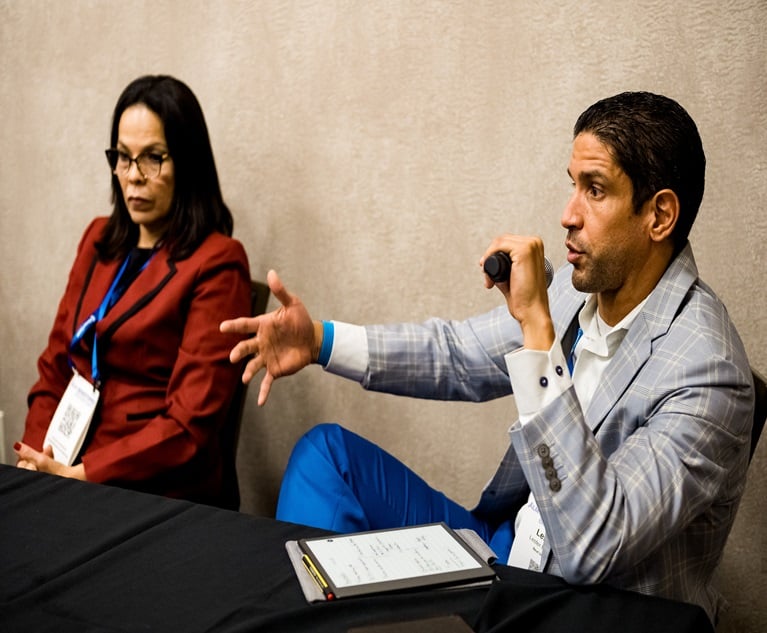Just say no
|Barry Zalma wrote a fantastic article, “Saying no” (AA&B February 2011). We constantly fight theadded paperwork or entries into agency software. Interestinglyenough, how many times do we even get from carrier trainingcommands including “skip here” and “just go to” that make it worse?I would love to see this article be a must-read for everyone in ourindustry.
Gregory Nehra
Grosse Pointe Woods, Mich.
Ethical dilemma
|I enjoyed Chris Amrhein's March 2011 article (“Don't get even, get ethical”) very much. Sometimes alittle perspective is something everyone can use.
|I taught an insurance class at Washington University last yearand I started off by giving everyone in the class a $1 bill. I toldthem they had just formed an insurance company and were nowresponsible for anything that happened to me or any damage I causedduring the semester and asked if they had any questions. I alsopointed out that my insurance premiums were too high and I thoughtthey should lower their rates. There were no questions forthcomingso I prodded a bit and asked if they wanted to limit the liabilitythey would pay. Did they want to exclude earthquake on my house?Then I asked if they cared how much it would cost to replace myhouse, because they were responsible. Naturally, everyoneunderstood they weren't actually on the hook to pay anything, butit did put things in a little different perspective for them. Ithink I enjoyed the sessions as much as they did.
Rick Mayhew
CPCU, CIC, St. Louis
Much of my work comes from the disillusionment of the generalinsurance buying public. While that statement is a littleoverblown, there is a lot of truth to the idea that insurancebuyers really want someone on their side of the table to counterthe antics of the insurance providers on the other side of thetable.
|The tricksters will always be out there; that means there willalways be work for you and me and some of the other folks we know.Keep up the good work.
Scott M. LeMay
CRM, ARM, Germantown, Tenn.
Social swimming
|I'm part of the three-specialist social media within publicaffairs at State Farm Corporate. I read Rick Morgan and CharlesWasilewski's article “Swim through the social Web” (AA&B April 2011) and want tothank you for capturing the essence of why it's important to take adeliberate look at social media response staffing and strategy. Thepiece provides context around the importance and consequences themedium affords.
Matt Kelly
Bloomington, Ill.
Nonpayment points
|I was quite interested in Barry Zalma's “Cancellation to litigation” (AA&B May 2011) suggesting aseries of steps to take when a policy is being cancelled fornonpayment. I know some of my students will say they were trainednot to follow up on late payment situations. Some E&Oinstructors advise agents not to follow up. They believe it createsa “special relationship” that could bite them in court. Fail tofollow up just once and the insured will say, “My agent alwayscalls when the policy is going to cancel. This time I didn't hearfrom him therefore I thought I was OK.”
|I don't advise my students to do one thing or the other. It'stheir business decision. I do recommend that they be consistent.Whatever you decide your policy is going to be, stick with it andput procedures in place to make sure it gets followed. Additionalthoughts would be appreciated.
Ralph Guarasci
Worthington, Ohio
E&O carriers have stated for years that calling the insuredsfor nonpayment exposes us to a greater liability than leaving thenotifications to the company. If you make it a practice to calllate payers and you miss one, you become the responsible party. Weused to call and it helped our retention numbers, but thenotifications from the companies did not always arrive prior tocancellation. We now call to verify that bills went to the correctaddress but have refrained from doing anything else.
Ted Hamm
Paso Robles, Calif.
I question Barry Zalma's advice about calling the client when apremium is not paid. Many E&O cases result from clients relyingon an agent calling to remind them to pay their direct bill policy.If the agent fails to call to remind them to pay one month, theagent is sued based upon the pattern they have set in the past. Itis highly impractical to call every time you get a late notice.Many clients wait until the last day to pay. I agree that we are inthe service business, but repeated calls to late payers are a badprecedent to set.
William CIeuter
CPCU, CLU, Chicago
I'm not sure if contacting the insured for notpaying the premium is only in the case of an address problem, or doyou mean contacting every insured on every late payment? If youmean contacting every insured on every late payment, that's notwhat the E&O carriers have been telling us. The companycancellation notice should be the final legal notice fornon-payment of premium unless there is an address issue.
Doug Charles
Crown Point, Ind.
Zalma response: Interesting points. Fear oflitigation can create the problem trying to be avoided. Agents andbrokers, just like lawyers, are in a service business. They arealso in business to make money.
|If an insured's policy is canceled because he or she failed topay a premium in a timely manner, the agent or broker loses thecommission he or she would have earned if reminded. Second, acancellation for nonpayment of premium can make it difficult for aninsured to obtain replacement insurance.
|People forget. If an agent or broker is advised of a pendingcancellation before it takes effect, the agent fails in anobligation to provide the service he was hired to provide. If he orshe fails to write or call to advise the client of the problemsthat he will have if the premium is not paid and it could be curedthe insured can avoid the stigma of a cancellation for nonpayment.If the policyholder wants to go to another insurer, thepolicyholder should cancel directly to avoid the stigma of acancellation for no payment. This is not raising a specialfiduciary relationship but just a follow-up to keep the client'sinsurance current.
|I do agree that the agent or broker should be consistent—eitherdo it or don't for all clients. I see a better chance of being suedif there is no reminder than if there is one.
|Overdue bills would put too much pressure on most agents, butwhen an agent receives notice of cancellation from an insurer, I asa customer who simply forgot would want to receive a call from theagent. Some insureds also think there is no problem letting apolicy expire and be canceled by the insurer for nonpayment. Theyneed to be told that doing so puts a stigma on them for having apolicy canceled for nonpayment when they could cancel it themselvesat expiration with no stigma.
|Kindness goes far
|Lisa Harrington's article “Kindness as leadership” (AA&B May 2011) wasoutstanding!
George Nordhaus
Santa Fe, N.M.
What a wonderful article on leadership!! I believe in the KINDacronym and use it in my work life. Just thought I'd drop a note tolet you know how much I enjoyed it.
Rusty Hughes
Birmingham, Ala.
Want to continue reading?
Become a Free PropertyCasualty360 Digital Reader
Your access to unlimited PropertyCasualty360 content isn’t changing.
Once you are an ALM digital member, you’ll receive:
- All PropertyCasualty360.com news coverage, best practices, and in-depth analysis.
- Educational webcasts, resources from industry leaders, and informative newsletters.
- Other award-winning websites including BenefitsPRO.com and ThinkAdvisor.com.
Already have an account? Sign In
© 2024 ALM Global, LLC, All Rights Reserved. Request academic re-use from www.copyright.com. All other uses, submit a request to [email protected]. For more information visit Asset & Logo Licensing.








